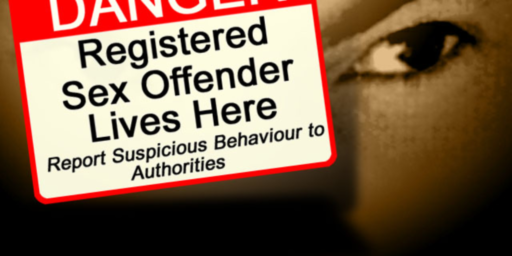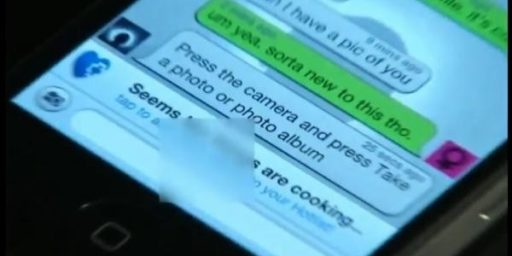Registries for Meth Makers
Illinois has followed Tennessee’s lead in establishing an public registry for meth manufacturers.
Like sex offenders and tax dodgers, methamphetamine makers are now being listed on Internet registries in several states.
Tennessee brought the nation’s first such registry online in 2005, and it now carries information on almost 400 convicted meth manufacturers, according to the state Bureau of Investigations. In Illinois, Gov. Rod Blagojevich (D) signed a law June 4 creating a convicted meth manufacturer registry .
The registries mark a new tool for states in combating the abuse and production of the illegal drug, also known as crystal meth, ice, glass and speed. It can cause stroke, paranoia, anxiety, delusions and violent behavior, as well as damage to blood vessels and skin abscesses in those who inject the drug, according to the National Institute on Drug Abuse. Meth production labs are dangerous, smelly and toxic to children exposed to the fumes. Nearly all states already have laws limiting sales of cold tablets containing pseudoephedrine, a key ingredient in meth production.
At least four states — Georgia, Oklahoma, Washington and West Virginia — have bills pending that would create a meth-maker registry. An Oregon bill would require the state to alert residents — whether through an Internet registry or other means — when a convicted meth maker is released from prison into their area. And Montana has included meth makers in its sexual and violent offender registry since 2003, though it does not list them separately.
Because as we all know, the best way to prevent recidivism is to make it impossible for an ex-con to enjoy any semblance of a normal life. After all, when a person is ostracized by their neighbors and subject to all sorts of threats, that would in no way provide an incentive for that person to return to crime or drugs, right?
Heck, while we’re at it, why not just have a registry for all crimes, ever? After all, I’m sure that you want to know if your neighbor has ever had a speeding ticket, run a stop light, got caught drinking underage (sure he’s 40 now, but that just means he has twenty years of flagrant lawbreaking behind him!). After all, you have children to think about. Besides, those scumbags should have thought about the consequences of their action. We have to protect ourselves–because it’s not like people are capable of change, you know?
In fact, maybe even just crimes aren’t enough. Dammit, you have a right to know if your neighbor was found liable in a civil suit, too, don’t you? I mean, maybe one time he lost a case in court because his fence encroached his neighbor’s yard in his old house. Now his fence might be encroaching your property!
Of course, once you start having all of these registries, it’s impossible to keep track of all the information about a particular person. The solution to this is obvious, of course. People should be forced to wear some kind of lettering or symbol that let’s people know that they were guilty of a crime, or found liable in a suit. Nothing as uncivilized as branding or tatooing–yet, anyway. Say, for example, you live in a state that doesn’t have no-fault divorce. But he commits adultery and his wife divorces him. Don’t you, as a single woman living in that neighborhood and thinks he’s kind of cute, have the right to know about his past? Shouldn’t he have to wear oh, say, a scarlet “A” on his jacket so that you know he’s an adulterer?
Really, this is the only system that makes sense. After all, innocent people have nothing to hide, right? Now, about that porch you have that’s 8″ wider than the city zoning ordinance allows…
(link via Radley Balko)






Why do we need this? Just ask the children or the teenagers, they’ll have heard where the meth labs are in the neighborhood. It is good teen gossip. Makes you seem worldly.
Perhaps the registry could be used to prevent these people from buying any cold medicine, then we’d all know who they were as they would have a runny nose and sinus pressure?
Bah. All of this information is already public; these bills would simply collect the information and distribute it to the affected public. The consequences of crime should be ostracism and shame. Fines and imprisonment are ineffective if they are the only consequences. While long prison terms via RICO were effective in effectively bringing down the mob, this solution is not infinitely applicable because we don’t have the resources or the will to build enough prisons to make it work. Shame and inconvenience are far cheaper and much more effective, and do not serve as schools for lawbreaking, as prisons often do. Only 50 or 60 years ago, shame and inconvenience worked pretty well as deterrents. Society got too big for it, but technology can help to overcome the difficulties.
Why the problem with people having a known character? People of good character have nothing to be ashamed of. Or should we go to where we are with job references, where the former employer of a crummy employee can’t be honest when asked about the employee’s performance without getting sued, effectively reducing the value of job references to zero?
Alex, you left out the part about having to wear a sandwich board proclaiming the crime you have been found guilty of.
“Because as we all know, the best way to prevent recidivism is to make it impossible for an ex-con to enjoy any semblance of a normal life.”
Remember that the “normal life” they enjoyed before was cooking meth, often in homes with kids running around.
Do you naively think that they’ll now go to college and start working in an office if we just give them some privacy? Keep an eye on them and if they revert to their old ways lock them up again.